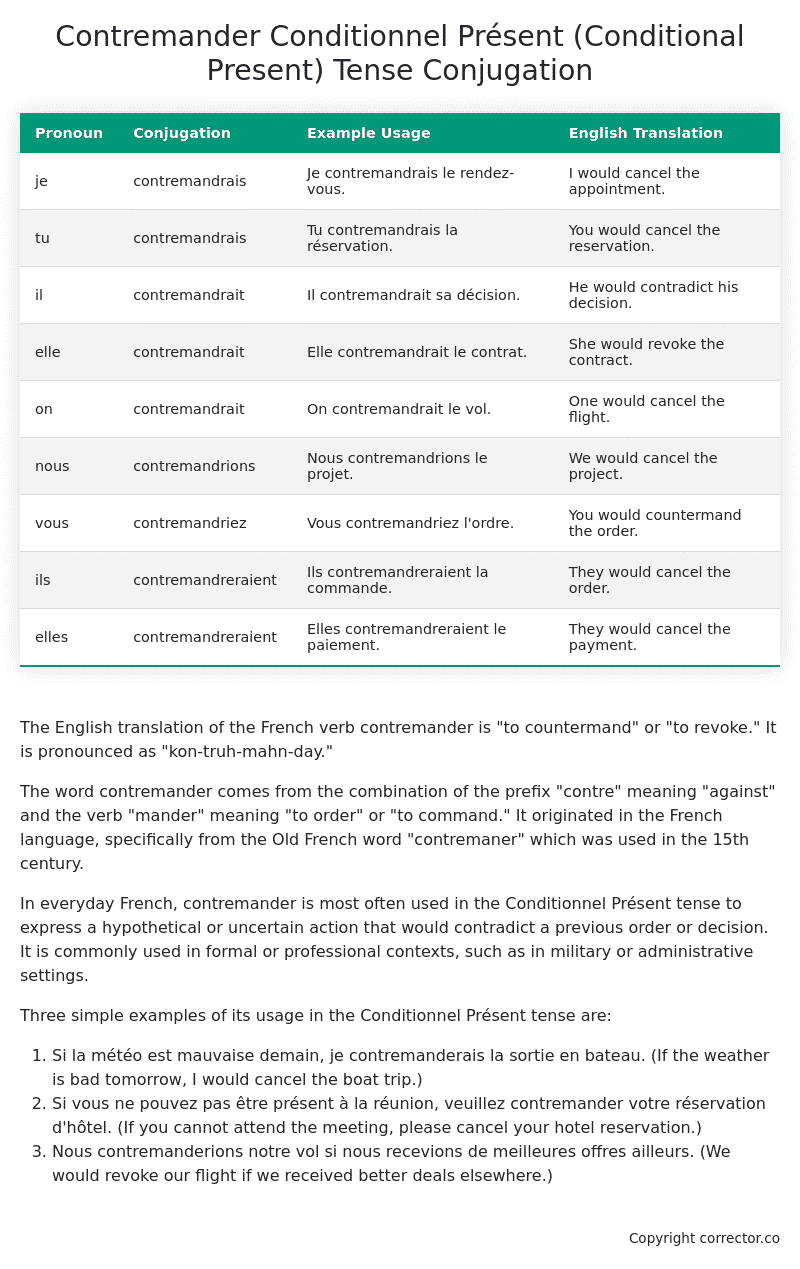Conditionnel Présent (Conditional Present) Tense Conjugation of the French Verb contremander
Introduction to the verb contremander
The English translation of the French verb contremander is “to countermand” or “to revoke.” It is pronounced as “kon-truh-mahn-day.”
The word contremander comes from the combination of the prefix “contre” meaning “against” and the verb “mander” meaning “to order” or “to command.” It originated in the French language, specifically from the Old French word “contremaner” which was used in the 15th century.
In everyday French, contremander is most often used in the Conditionnel Présent tense to express a hypothetical or uncertain action that would contradict a previous order or decision. It is commonly used in formal or professional contexts, such as in military or administrative settings.
Three simple examples of its usage in the Conditionnel Présent tense are:
- Si la météo est mauvaise demain, je contremanderais la sortie en bateau. (If the weather is bad tomorrow, I would cancel the boat trip.)
- Si vous ne pouvez pas être présent à la réunion, veuillez contremander votre réservation d’hôtel. (If you cannot attend the meeting, please cancel your hotel reservation.)
- Nous contremanderions notre vol si nous recevions de meilleures offres ailleurs. (We would revoke our flight if we received better deals elsewhere.)
Table of the Conditionnel Présent (Conditional Present) Tense Conjugation of contremander
| Pronoun | Conjugation | Example Usage | English Translation |
|---|---|---|---|
| je | contremandrais | Je contremandrais le rendez-vous. | I would cancel the appointment. |
| tu | contremandrais | Tu contremandrais la réservation. | You would cancel the reservation. |
| il | contremandrait | Il contremandrait sa décision. | He would contradict his decision. |
| elle | contremandrait | Elle contremandrait le contrat. | She would revoke the contract. |
| on | contremandrait | On contremandrait le vol. | One would cancel the flight. |
| nous | contremandrions | Nous contremandrions le projet. | We would cancel the project. |
| vous | contremandriez | Vous contremandriez l’ordre. | You would countermand the order. |
| ils | contremandreraient | Ils contremandreraient la commande. | They would cancel the order. |
| elles | contremandreraient | Elles contremandreraient le paiement. | They would cancel the payment. |
Other Conjugations for Contremander.
Le Present (Present Tense) Conjugation of the French Verb contremander
Imparfait (Imperfect) Tense Conjugation of the French Verb contremander
Passé Simple (Simple Past) Tense Conjugation of the French Verb contremander
Passé Composé (Present Perfect) Tense Conjugation of the French Verb contremander
Futur Simple (Simple Future) Tense Conjugation of the French Verb contremander
Futur Proche (Near Future) Tense Conjugation of the French Verb contremander
Plus-que-parfait (Pluperfect) Tense Conjugation of the French Verb contremander
Passé Antérieur (Past Anterior) Tense Conjugation of the French Verb contremander
Futur Antérieur (Future Anterior) Tense Conjugation of the French Verb contremander
Subjonctif Présent (Subjunctive Present) Tense Conjugation of the French Verb contremander
Subjonctif Passé (Subjunctive Past) Tense Conjugation of the French Verb contremander
Subjonctif Imparfait (Subjunctive Imperfect) Tense Conjugation of the French Verb contremander
Conditionnel Présent (Conditional Present) Tense Conjugation of the French Verb contremander (this article)
Conditionnel Passé (Conditional Past) Tense Conjugation of the French Verb contremander
L’impératif Présent (Imperative Present) Tense Conjugation of the French Verb contremander
L’infinitif Présent (Infinitive Present) Tense Conjugation of the French Verb contremander
Struggling with French verbs or the language in general? Why not use our free French Grammar Checker – no registration required!
Get a FREE Download Study Sheet of this Conjugation 🔥
Simply right click the image below, click “save image” and get your free reference for the contremander Conditionnel Présent tense conjugation!

Contremander – About the French Conditionnel Présent (Conditional Present) Tense
Formation
Common Everyday Usage Patterns
Expressing Polite Requests
Expressing Hypothetical Situations
Expressing Doubt or Uncertainty
Interactions with Other Tenses
Present Tense
Past Tense
Future Tense
Conditional Perfect
Summary
Want More?
I hope you enjoyed this article on the verb contremander. Still in a learning mood? Check out another TOTALLY random French verb conjugation!


